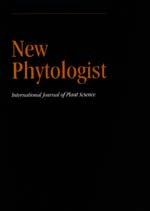Crossref Citations
This article has been cited by the following publications. This list is generated based on data provided by
Crossref.
Brundrett, Mark C.
2002.
Coevolution of roots and mycorrhizas of land plants.
New Phytologist,
Vol. 154,
Issue. 2,
p.
275.
Thorn, R. Greg
2003.
Encyclopedia of Environmental Microbiology.
Beauchamp, Vanessa B.
Stromberg, Juliet C.
and
Stutz, Jean C.
2005.
Interactions between Tamarix ramosissima (Saltcedar), Populus fremontii (Cottonwood), and Mycorrhizal Fungi: Effects on Seedling Growth and Plant Species Coexistence.
Plant and Soil,
Vol. 275,
Issue. 1-2,
p.
221.
Gange, Alan C.
Gane, Dominic R. J.
Chen, Yinglong
and
Gong, Mingqin
2005.
Dual colonization of Eucalyptus urophylla S.T. Blake by arbuscular and ectomycorrhizal fungi affects levels of insect herbivore attack.
Agricultural and Forest Entomology,
Vol. 7,
Issue. 3,
p.
253.
Kernaghan, Gavin
2005.
Mycorrhizal diversity: Cause and effect?.
Pedobiologia,
Vol. 49,
Issue. 6,
p.
511.
Gange, Alan C.
2007.
Ecological Communities.
p.
124.
Chen, Ying Long
Liu, Shuie
and
Dell, Bernard
2007.
Mycorrhizal status of Eucalyptus plantations in south China and implications for management.
Mycorrhiza,
Vol. 17,
Issue. 6,
p.
527.
Ma, Dalong
Yang, Guoting
and
Mu, Liqiang
2010.
Morphological and molecular analyses of ectomycorrhizal diversity in Pinus densiflora seedlings.
Symbiosis,
Vol. 51,
Issue. 3,
p.
233.
Jansa, Jan
and
Gryndler, Milan
2010.
Arbuscular Mycorrhizas: Physiology and Function.
p.
209.
Newcombe, George
Martin, Francis
and
Kohler, Annegret
2010.
Genetics and Genomics of Populus.
p.
247.
Madejón, E.
Doronila, A. I.
Madejón, P.
Baker, A. J. M.
and
Woodrow, I. E.
2012.
Biosolids, mycorrhizal fungi and eucalypts for phytostabilization of arsenical sulphidic mine tailings.
Agroforestry Systems,
Vol. 84,
Issue. 3,
p.
389.
Kariman, Khalil
Barker, Susan J.
Finnegan, Patrick M.
and
Tibbett, Mark
2012.
Dual mycorrhizal associations of jarrah (Eucalyptus marginata) in a nurse-pot system.
Australian Journal of Botany,
Vol. 60,
Issue. 8,
p.
661.
Chen, Ying Long
Liu, Run Jin
Bi, Yin Li
and
Feng, Gu
2014.
Mycorrhizal Fungi: Use in Sustainable Agriculture and Land Restoration.
Vol. 41,
Issue. ,
p.
325.
Dundas, Shannon J.
Hopkins, Anna J. M.
Ruthrof, Katinka X.
Tay, Natasha E.
Burgess, Treena I.
Hardy, Giles E. St. J.
and
Fleming, Patricia A.
2018.
Digging mammals contribute to rhizosphere fungal community composition and seedling growth.
Biodiversity and Conservation,
Vol. 27,
Issue. 12,
p.
3071.
Birnbaum, Christina
Morald, Tim K.
Tibbett, Mark
Bennett, Richard G.
and
Standish, Rachel J.
2018.
Effect of plant root symbionts on performance of native woody species in competition with an invasive grass in multispecies microcosms.
Ecology and Evolution,
Vol. 8,
Issue. 17,
p.
8652.
Queralt, M
Walker, J K M
de Miguel, A M
Parladé, J
Anderson, I C
and
Hortal, S
2019.
The ability of a host plant to associate with different symbiotic partners affects ectomycorrhizal functioning.
FEMS Microbiology Ecology,
Vol. 95,
Issue. 6,
Adeleke, Rasheed A.
Nunthkumar, Bhavna
Roopnarain, Ashira
and
Obi, Linda
2019.
Microbiome in Plant Health and Disease.
p.
1.
Teste, François P.
Jones, Melanie D.
and
Dickie, Ian A.
2020.
Dual‐mycorrhizal plants: their ecology and relevance.
New Phytologist,
Vol. 225,
Issue. 5,
p.
1835.
Balandier, Philippe
Mårell, Anders
Prévosto, Bernard
and
Vincenot, Lucie
2022.
Tamm review: Forest understorey and overstorey interactions: So much more than just light interception by trees.
Forest Ecology and Management,
Vol. 526,
Issue. ,
p.
120584.
Peretti, Alfredo V.
Calbacho-Rosa, Lucía S.
Olivero, Paola A.
Oviedo-Diego, Mariela A.
and
Vrech, David E.
2024.
Rules and Exceptions in Biology: from Fundamental Concepts to Applications.
p.
223.


